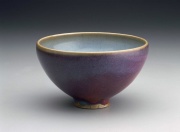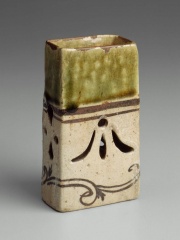Difference between revisions of "Copper oxide glaze"
Jump to navigation
Jump to search
(username removed) |
m (Text replace - "== Authority ==" to "== Sources Checked for Data in Record ==") |
||
| Line 13: | Line 13: | ||
H.Hodges, ''Artifacts: An introduction to early materials and technology'', Ronald P. Frye, Kingston, 1988. | H.Hodges, ''Artifacts: An introduction to early materials and technology'', Ronald P. Frye, Kingston, 1988. | ||
| − | == | + | == Sources Checked for Data in Record == |
* Henry Hodges, ''Artifacts: An Introduction to Early Materials and Technology'', Ronald P. Frye, Kingston, Canada, 1988 | * Henry Hodges, ''Artifacts: An Introduction to Early Materials and Technology'', Ronald P. Frye, Kingston, Canada, 1988 | ||
Revision as of 14:20, 29 April 2016
Description
Under oxidizing conditions, copper oxide will produce blue (with potassium oxide) or green (with lead oxide) glazes and under reducing conditions, copper oxide will produce red or or black glazes (Hodges 1988).
Synonyms and Related Terms
glaçure à l'oxyde cuivre (Fr.); vidrado de óxido de cobre (Port.)
Additional Information
H.Hodges, Artifacts: An introduction to early materials and technology, Ronald P. Frye, Kingston, 1988.
Sources Checked for Data in Record
- Henry Hodges, Artifacts: An Introduction to Early Materials and Technology, Ronald P. Frye, Kingston, Canada, 1988

